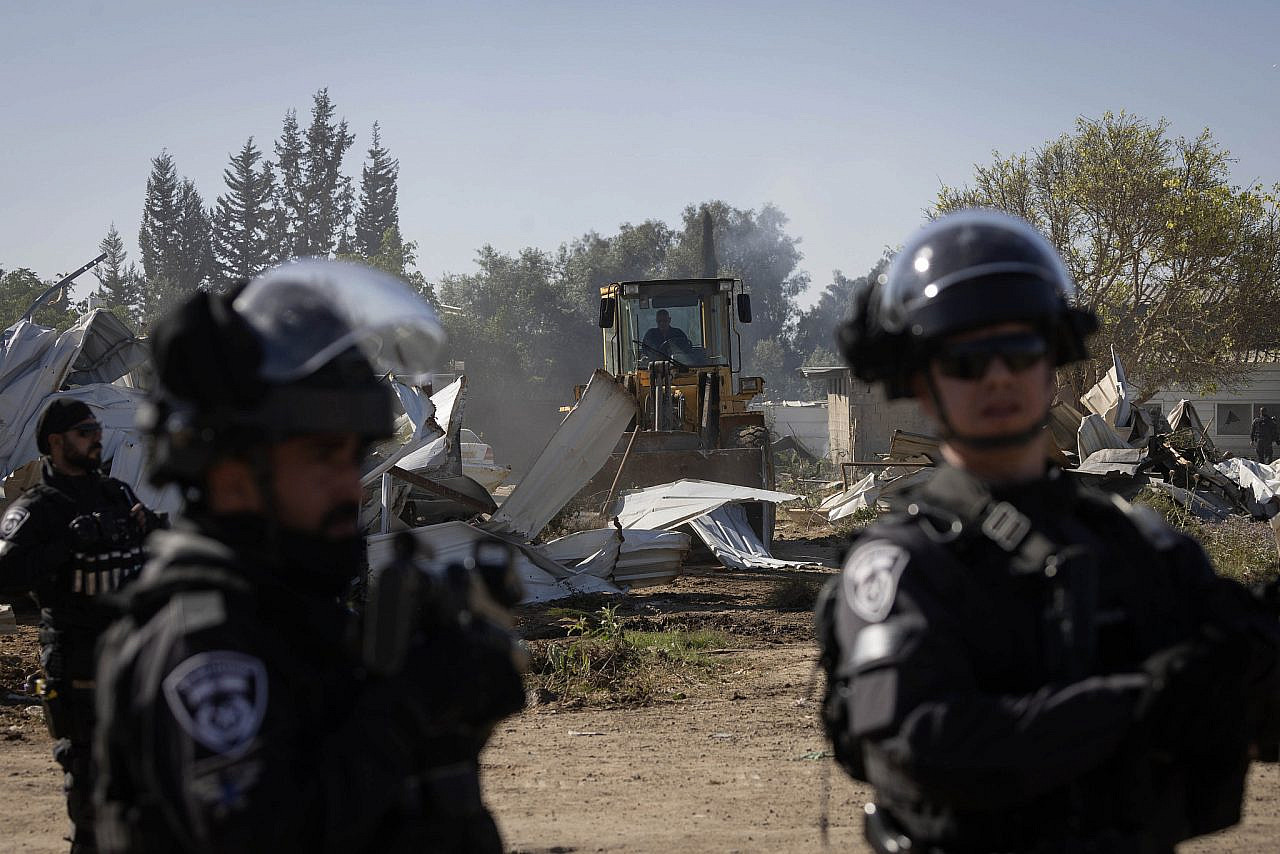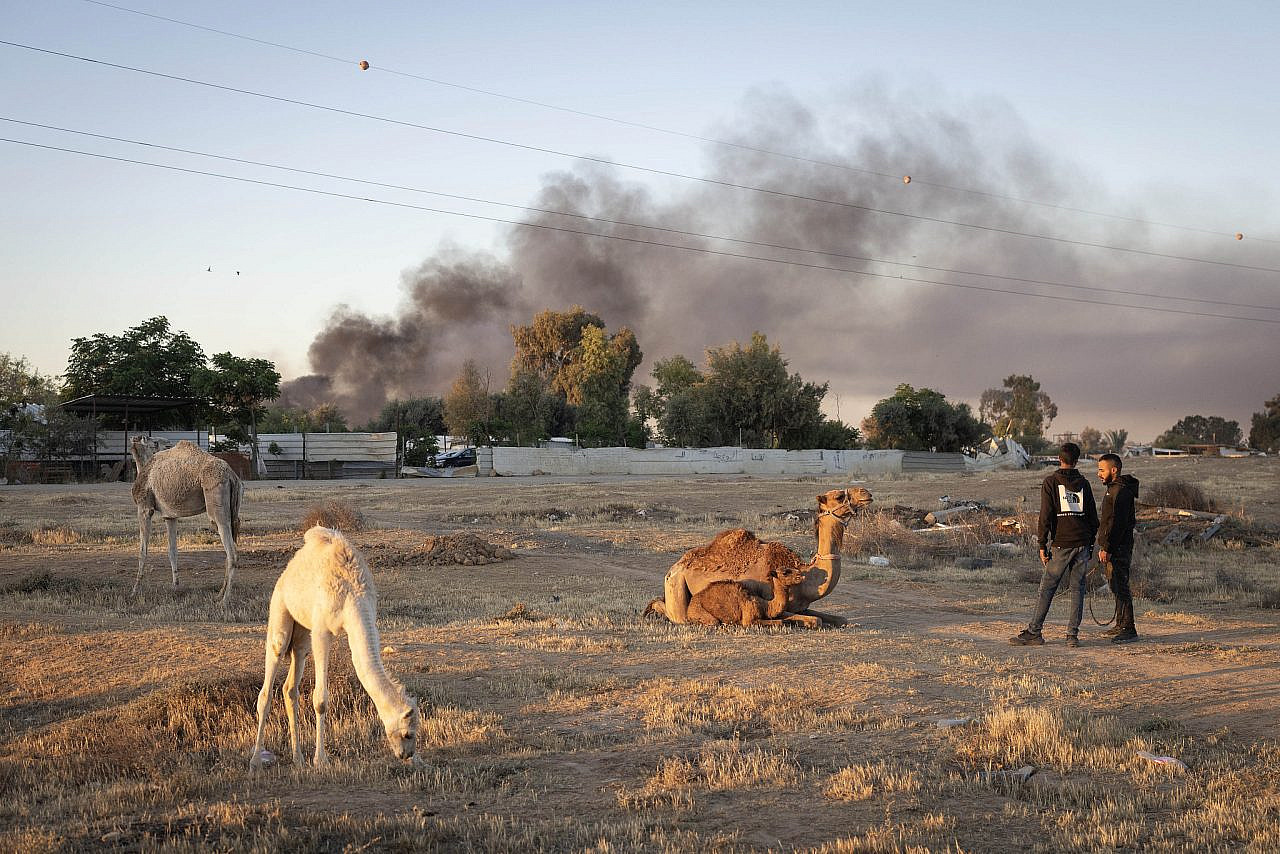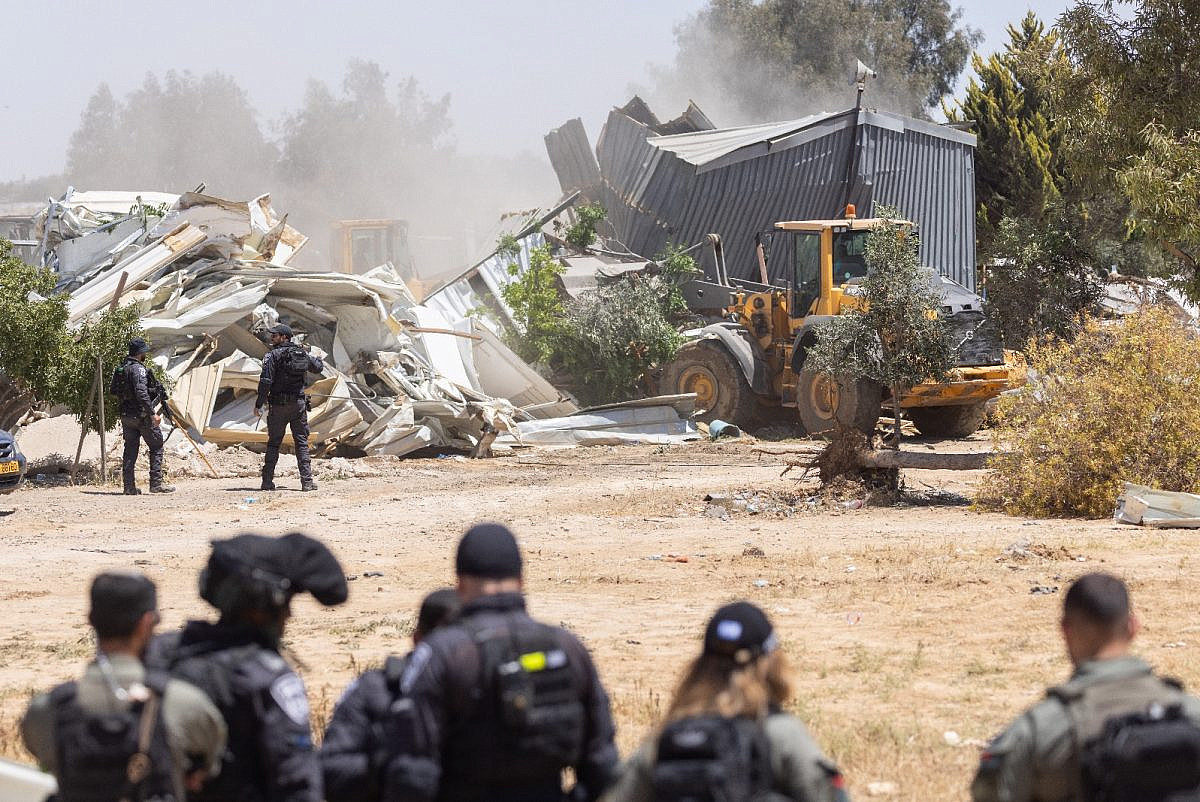On the morning of May 8, Israeli forces razed the entire Bedouin village of Wadi al-Khalil in the Naqab/Negev desert. The demolitions, which were carried out in order to expand the Route 6 highway, left more than 300 residents homeless.
Wadi al-Khalil is one of 35 Bedouin villages in the Naqab whose existence the Israeli authorities do not officially recognize; as a result, the villages, which are home to around 150,000 Bedouin Arab citizens of Israel, face the constant threat of demolition. Many of the villages are decades old — some even pre-date Israel’s establishment — but they are prevented from connecting to state infrastructure including water and electricity, and their residents are denied municipal services.
According to the Regional Council for the Unrecognized Bedouin Villages, Wednesday’s demolition was the largest in the Naqab for 14 years. It comes as Israel’s National Security Minister Itamar Ben Gvir vows to crack down on what he calls “lawbreakers” and restore meshilut — literally “governance,” a euphemism for Jewish-Israeli control — to the area. Eight other unrecognized villages are currently under threat of forced eviction under the guise of urban development.
The police’s arrival in the village was not met with resistance. Officers pushed the residents and a handful of solidarity activists to the outskirts of the village before bringing in trucks and bulldozers. Contractors in yellow vests removed furniture and any personal items that had been left inside the residents’ homes and loaded them onto the trucks. A few horses and camels wandered restlessly between the officers and vehicles as the bulldozers got to work.
“You work eight or nine years, saving money to build a house, and then they destroy it,” Yousef Abu Issa, a 35-year-old resident, told +972 and Local Call. “They don’t give you another place to live, they don’t help you.”

As a precautionary measure Yousef had taken his children out of the village before the demolitions began. He was sitting in his car when I spoke with him, watching the police raze the buildings while smoke engulfed some of the houses that residents themselves had set on fire before the authorities could demolish them.
“Look how many police officers are here,” he said. “Where were they on October 7? A force like this could conquer Lebanon. I feel no differently toward them than I do toward the terrorists of the Nukhba [Hamas’ elite commando unit]. I’m an Israeli citizen, loyal to the state, I do national service — and this is what happens.”
Taleb el-Sana, a former Knesset member and a Bedouin Arab citizen, described Wednesday’s demolitions and the government’s treatment of the residents of the Naqab as “a declaration of war.”
“Ben Gvir wants to burn the Naqab,” el-Sana told +972. “Instead of solving the problem through communication, [the government] thinks that demolishing houses is the solution. But it’s not. We are citizens. Bedouins were killed [on October 7], Bedouins are among the hostages being held by Hamas in Gaza, and Bedouin houses have been hit by rockets. The solution is to recognize villages, and grant people the basic right to live in dignity.”
‘We have never been opposed to a compromise’
Demolishing Bedouin houses in the Naqab is nothing new for the Israeli authorities. The nearby village of Al-Araqib was recently razed for the 223rd time. In 2017, police raided another unrecognized village, Umm al-Hiran, to conduct demolitions that would see the small Bedouin community replaced with a Jewish one; police in the village shot dead resident Yaqub Abu al-Qi’an, falsely claiming he had tried to kill officers.
In 2010, the government approved a plan to extend Route 6 southward through the lands of Wadi al-Khalil, despite opposition from the residents and several NGOs. The residents repeatedly expressed their willingness to relocate to the neighborhood of Al-Mitla, east of the Bedouin town of Tel as-Sabi/Tel Sheva. But this proposal was rejected, and Israel’s Bedouin Authority for Development and Settlement insisted instead that the residents move to Neighborhood 1 in Umm Batin.

The residents opposed this plan out of fear for their own safety: according to them, a large Bedouin family that currently lives next to Neighborhood 1 threatened violence against any other clans who settled there. “They offered us a place in Neighborhood 1, a place that couldn’t work and where there was a dispute,” Suleiman Abu Issa told +972. “If we moved there it would be a mess: when a similar situation happened in Lakiya, it ended in murder.”
In February 2023, the residents of Wadi al-Khalil appealed to the Supreme Court against their forced transfer to Neighborhood 1 and against the demolition orders, but the appeal was rejected in December. The Court sided with the state’s position that the move to Al-Mitla would delay the extension of Route 6 by two years because the necessary infrastructure there is not yet in place. Another appeal, in which the residents requested that the Interior Ministry approve their relocation to Al-Mitla, is ongoing.
“We have never been opposed to finding a solution or a compromise,” Suleiman explained. “Our demands are modest: an appropriate place [to live] and adequate compensation. They said we were refusing [the government’s expulsion orders], but this is not true.”
Dafna Saporta, from the Israeli planning rights organization Bimkom told +972: “It’s not like the extension of Route 6 is being paved tomorrow — it would have been possible to postpone and sit down with the residents, who have been there for decades. The state had 15 years to reach agreements with the residents regarding their evacuation. The residents didn’t refuse to evacuate, they just didn’t agree to the solution that the state proposed in Umm Batin because of conflicts with other families on the land.
“In the past, there were talks about trying to move the families to Al-Mitla — this was approved by all the planning committees, and it got stuck with the interior minister,” Saporta continued. “It was of course possible to prevent the demolition and find a fair solution with the residents. They didn’t do it, and instead they left over 300 people with destruction and pain. It is a testament to [Israel’s] policy of doing things over the heads of residents through the illegitimate pressure mechanism of house demolitions.”
Most read on +972
The current wave of demolitions in the Naqab is widely attributed to Ben Gvir by residents and activists, and the national security minister’s office seemed proud to take credit. In a press release on the morning of the demolition, his office stated: “The demolition of dozens of illegal structures in the Abu Issa cluster in the Negev was an important step for sovereignty and governance. Indeed, as the minister promised upon taking office, there has been a significant increase in the demolition of illegal houses in the Negev, and the minister is proud to be leading this policy.
“Let every lawbreaker in the Negev know that the lands of the Negev have not been abandoned, and that the State of Israel will fight a brutal war against those who try to take over land and try to establish facts on the ground,” the statement continued.
“Since the founding of the state,” Suleiman lamented, “there has been a problem with [land] administration — but never anything like this, this kind of stubbornness. When they talk to you it’s like they’re not talking to another human being. The state has lost all shame. For them, ‘governance’ is simply destruction.”
A version of this article was first published in Hebrew on Local Call. Read it here.





